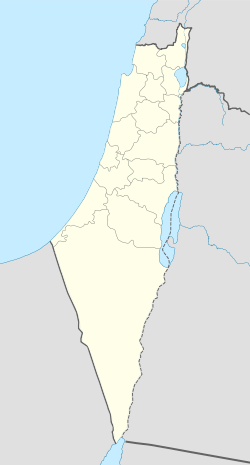Arab al-Fuqara
Arab al-Fuqara (Arabic: عرب الفقراء) was a Palestinian Arab village in the Haifa Subdistrict. It was depopulated during the 1947–1948 Civil War in Mandatory Palestine on April 10, 1948.[2] At that time, the land records of the village consisted of a total area of 2,714 dunams, of which 2,513 were owned by Jews, 15 owned by Arabs, and the remaining 186 dunams being public lands.
Arab al-Fuqara عرب الفقراء/الشيخ حلو | |
|---|---|
| Etymology: Sheikh Helu, p.n[1] | |
 Arab al-Fuqara | |
| Coordinates: 32°27′08″N 34°54′21″E | |
| Palestine grid | 140/206 |
| Geopolitical entity | Mandatory Palestine |
| Subdistrict | Haifa |
| Date of depopulation | April 10, 1948[2] |
| Area | |
| • Total | 15 dunams (1.5 ha or 4 acres) |
| Population (1945) | |
| • Total | 310[4][5] |
| Cause(s) of depopulation | Expulsion by Yishuv forces |
| Current Localities | Hadera[6] |
Location
The village was located 42 km southwest of Haifa, south of Wadi al-Mafjar and northwest of Hadera, in a flat, sandy area.[6]
History

In 1882, the PEF's Survey of Western Palestine (SWP) described a local Mukam Sheikh Helu here, and noted a few adobe houses near, which were not noticed in the official [Government] lists.[7]
British Mandate era
The Arab villagers were descendants of a section of the al-Balawina Bedouin tribe, whose primary territory was near Beersheba.[6] The area was generally swampy and malarial, and this limited population growth until the mid-1920s.
The gradual and legal expansion of the Jewish town Hadera reduced the free public land available to the Arab villagers, until only a thin strip of land between Hadera and Wadi al-Mafjar was retained (15 dunams),[6] where the land was considered non-cultivable.[8]
The village population in the 1945 statistics was 310, all Muslims.[4][5]
1948 and aftermath
On 6 April 1948, the Haganah implemented a new policy for the coastal plains, namely of clearing the whole area of its Arab inhabitants.[9] On 10 April, the villagers of Arab al-Fuqara, together with the villagers of Arab al-Nufay'at and Arab Zahrat al-Dumayri, were ordered to leave the area.[10]
Following the 1948 war, the area was incorporated into the State of Israel and the village's land is now part of the northwestern area of Hadera.[6]
References
- Palmer, 1881, p. 141
- Morris, 2004, p. xviii, village #180. Also gives cause of depopulation
- Hadawi, 1970, total area of 2,714 dunams was divided as Arab owned 15 dunams, Jewish owned 2513 dunams, public 186 dunams
- Government of Palestine, Department of Statistics, 1945, p. 13
- Government of Palestine, Department of Statistics. Village Statistics, April, 1945. Quoted in Hadawi, 1970, p. 47
- Khalidi, 1992, p.144
- Conder and Kitchener, 1882, SWP II, p. 4
- Government of Palestine, Department of Statistics. Village Statistics, April, 1945. Quoted in Hadawi, 1970, p. 139
- Morris, 2004, p. 245, note 628
- Morris, 2004, p. 245, note 631
Bibliography
- Conder, C.R.; Kitchener, H.H. (1883). The Survey of Western Palestine: Memoirs of the Topography, Orography, Hydrography, and Archaeology. 3. London: Committee of the Palestine Exploration Fund.
- Government of Palestine, Department of Statistics (1945). Village Statistics, April, 1945.
- Hadawi, S. (1970). Village Statistics of 1945: A Classification of Land and Area ownership in Palestine. Palestine Liberation Organization Research Center.
- Khalidi, W. (1992). All That Remains: The Palestinian Villages Occupied and Depopulated by Israel in 1948. Washington D.C.: Institute for Palestine Studies. ISBN 0-88728-224-5.
- Morris, B. (2004). The Birth of the Palestinian Refugee Problem Revisited. Cambridge University Press. ISBN 978-0-521-00967-6.
- Palmer, E.H. (1881). The Survey of Western Palestine: Arabic and English Name Lists Collected During the Survey by Lieutenants Conder and Kitchener, R. E. Transliterated and Explained by E.H. Palmer. Committee of the Palestine Exploration Fund.
External links
- Welcome To 'Arab al-Fuqara'
- Arab al-Fuqara', from Zochrot
- Survey of Western Palestine, Map 7: IAA, Wikimedia commons
- Arab al-Fuqara', from the Khalil Sakakini Cultural Center